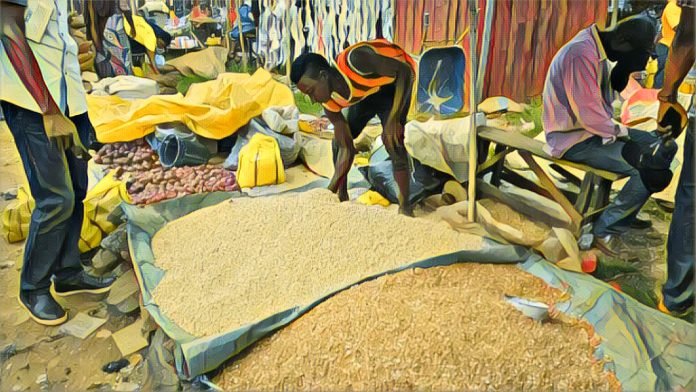Nigeria, Africa’s most populous nation, is facing a worsening food insecurity situation as the prices of staple foods continue to soar. According to experts, the country’s food production has declined for years, while inflation, conflict, climate change, and other factors have eroded the purchasing power of millions of poor Nigerians.
The latest data from the National Bureau of Statistics shows that the average prices of food items such as rice, vegetable oil, palm oil, garri, bread, eggs, and yam rose considerably in 2023. For instance, the average price of 1kg of local rice increased by 59.2 percent to N819.42 in October 2023 from N514.83 in January 2023. The average price of 1kg of imported rice increased by 36.6 percent to N1,016.12 from N744.12.
The rising costs of inputs such as fuel and logistics have also impacted food production and distribution, making it harder for farmers to access markets and consumers to afford food. Abiodun Olorundero, managing partner at Prasino Farms, said that the cost of diesel, which is used to power trucks and generators, had quadrupled in the past year.
“Diesel was about N200/litre. Now it sells for about N1,000 to N1,200/liter. And a truck that is bringing in those food items from the North where they are produced is consuming over 500 liters of diesel. Multiply that by the per-litre price and see what it amounts to,” he said.
The food insecurity situation has been exacerbated by the ongoing conflict in the north-east states of Borno, Adamawa, and Yobe, where more than 2 million people have been displaced by the insurgency of Boko Haram and other armed groups. According to the UN, about 4.4 million people in these states will face acute hunger in the lean season of 2024, up from 3 million in 2023.
The conflict has also disrupted agricultural activities, limiting access to farmland and reducing harvests. Many farmers have been killed, injured, or abducted by militants, while others have fled to safer areas. The UN estimates that about 676,000 hectares of farmland were damaged by floods in 2022, further affecting food production.
The food insecurity situation in Nigeria is not unique, as many other countries in Africa and beyond are also grappling with similar challenges. According to the 2023 State of Food Security and Nutrition in the World report, the number of people affected by hunger globally increased by 118 million in 2020, reaching 768 million – the highest level in 15 years.
The report attributed the rise in hunger to the combined effects of the COVID-19 pandemic, conflict, climate change, and economic shocks. It warned that achieving the Sustainable Development Goal of zero hunger by 2030 was becoming increasingly difficult, and called for urgent action to address the root causes of food insecurity and malnutrition.
Some of the actions recommended by the report include increasing social protection and humanitarian assistance, enhancing resilience and adaptation to climate change, promoting peace and stability, and transforming food systems to make them more inclusive, sustainable, and nutritious.
Despite the grim outlook, there are some signs of hope and progress in Nigeria’s food security situation. The government and its partners have been implementing various initiatives and policies to boost food production, reduce food waste, and improve food access and affordability.
For example, the government launched the National Livestock Transformation Plan in 2019 to modernize the livestock sector and address the recurrent clashes between farmers and herders. The plan aims to create ranches, provide veterinary services, and improve the quality and quantity of meat and dairy products.
The government also established the National Food Security Council in 2018 to coordinate and oversee the implementation of the national food security policy and strategy. The council is chaired by the president and comprises representatives from various ministries, agencies, and stakeholders.
Additionally, the government and its partners have been supporting smallholder farmers with inputs, training, and market linkages, as well as providing humanitarian assistance to the most vulnerable populations affected by conflict and displacement.
These efforts, coupled with the resilience and resourcefulness of the Nigerian people, offer some hope that the country can overcome its food insecurity challenges and achieve its food security goals.
Source: BusinessDay



